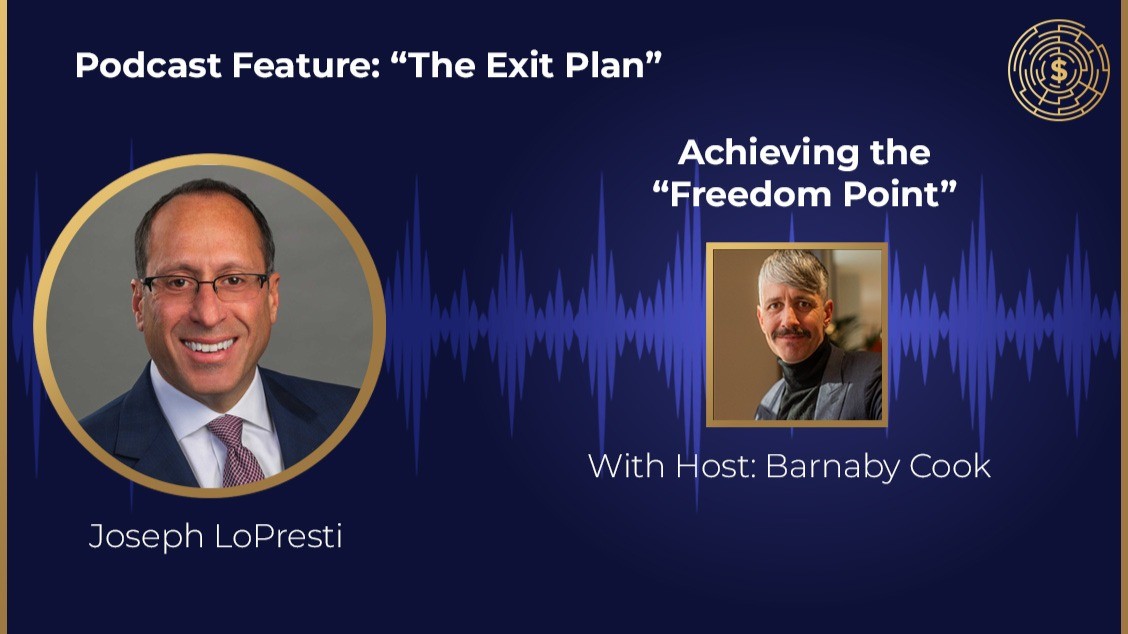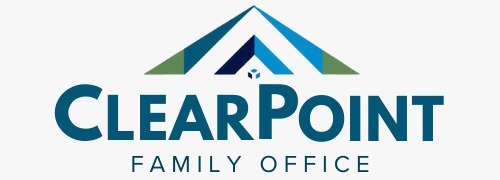
Are You Leaving Money on the Table with Your Business Exit?
As a business owner myself who has guided other entrepreneurs through life-changing transitions over my 40-year career, I’ve witnessed a troubling pattern that I recently discussed on “The Exit Plan” podcast: when it comes to selling your business, what you don’t know can cost you dearly.
I call it the “dumb tax” – that painful moment when a business owner realizes, too late, “I wish I would have known about that tax strategy” or “I never knew I could structure the sale that way.” After decades of hard work building your company, the last thing you want is regret following what should be your crowning achievement.

The Freedom Point: Your Ultimate Goal
Throughout my years of founding and leading Arlington Wealth Management, I’ve come to understand that most business owners value personal freedom above all else. It’s why you started your business in the first place – to call your own shots.
The “Freedom Point” – a concept I explore deeply in my book “Exit by Design” – represents that crucial financial threshold where you’ve accumulated enough wealth to live your ideal life without financial constraints. It’s not just about funding your lifestyle perpetually; it’s about securing true freedom of time, relationships, and purpose.
But here’s the challenge: approximately 80% of a typical business owner’s wealth is locked inside their company. Without coordinated business and personal wealth planning, that wealth – and the freedom it should provide – can slip through your fingers during the exit process.
Why Your Current Advisory Structure May Be Failing You
On the podcast, I explained how most business owners receive siloed advice from their various professionals – accountants, attorneys, financial advisors, and consultants. While each expert may excel in their area, nobody is connecting the dots between them.
Think about it: your tax advisor might not understand how your estate plan impacts your business valuation. Your M&A consultant likely isn’t coordinating with your personal financial planner about post-exit cash flow. These disconnections create dangerous blind spots that can diminish your company’s selling price and erode your post-sale wealth.
The Lifetime Cash Flow Plan: Your Bridge to Financial Freedom
One of the biggest sources of anxiety for business owners contemplating an exit is uncertainty about future income. As I shared during the interview, “Business owners are so uneasy because they don’t understand where they’re going to get their income or how it’s going to be taxed, and really don’t know what they need from the business to be able to have that freedom.”
That’s why we create detailed Lifetime Cash Flow Plans that map exactly how much you need from your business sale to maintain your desired lifestyle, accounting for taxes, inflation, and other variables that could affect your financial security.
Building Value Through a Buyer’s Eyes
Here’s a hard truth many business owners miss: your business isn’t worth what you think it’s worth. To you, it’s priceless – your life’s work, your identity. But buyers evaluate companies through an entirely different lens.
During the podcast, I explained how we help owners understand and improve their “sellability score” by focusing on metrics buyers actually care about:
- How dependent is the business on you?
- What recurring revenue streams exist?
- What competitive advantages would a buyer acquire?
By addressing these areas well before a planned exit, you can dramatically increase your company’s value while simultaneously improving your quality of life.
Start With the End in Mind
What’s encouraging is that younger entrepreneurs are increasingly thinking about these issues early in their careers. Unlike many Baby Boomer business owners who only consider exit planning in their final years, forward-thinking owners are building businesses with the end in mind from the beginning.
This approach not only optimizes eventual sale value but also improves work-life balance along the way. As I noted in the podcast, “The less dependent the business could be on the owner, the more valuable it is. And that helps business owners while they’re in their career too, where they have more freedom of time.”
Your Personal Action Plan
Whether you’re one year or ten years from your inevitable exit, developing a Personal Action Plan is critical. This proactive approach helps you design an exit on your terms, considering:
- Who are your potential buyers?
- What role, if any, will you play post-sale?
- How will your employees be treated?
- Most importantly, what will you do that Monday morning after the sale?
As I emphasized on “The Exit Plan” podcast, most business owners don’t have answers to these questions – and that uncertainty often leads to post-sale regret.
The Next Step in Your Journey
Building a successful business is only part of the battle. It might get you to the twenty yard line, but not the end zone. Exiting successfully – in a way that maximizes your financial outcome and personal fulfillment – requires a different level of knowledge and expertise.
I firmly believe in the wisdom of Henry David Thoreau, which I shared during the podcast: “Wealth is the ability to fully experience life.” That’s the ultimate goal of everything we do at Arlington Wealth Management – helping business owners translate their entrepreneurial success into lasting freedom, security, and purpose.
Ready to start planning your optimal business exit?
Schedule a no-obligation, exploratory call with me. We’ll delve into where you are today and where you want to be tomorrow, formulating strategies to build and protect your wealth as you prepare for your ideal business endgame.
Joseph LoPresti, leads Arlington Wealth Management, and brings 40 years of wealth management and business expertise to the table. Joseph is passionate about guiding fellow business owners through a smooth and satisfying transition, and coordinating all aspects of their wealth toward a secure and prosperous life.
Arlington Wealth Management is a Registered Investment Adviser (“RIA”). Registration as an investment adviser does not imply a certain level of skill or training, and the content of this communication has not been approved or verified by the United States Securities and Exchange Commission or by any state securities authority. Arlington Wealth Management provides individualized responses to individuals in a particular state only after complying with the state’s regulatory requirements, or pursuant to an applicable state exemption or exclusion. All investments carry risk, and no investment strategy can guarantee a profit or protect against loss of capital. Advanced Tax Reduction Group (ATRG), an affiliate of AWM, may receive a portion of the fees from the services mentioned in this communication. ATRG offers tax planning, consulting, and preparation, as well as estate and business consulting for separate compensation. AWM clients are not obligated to use ATRG for these services.

